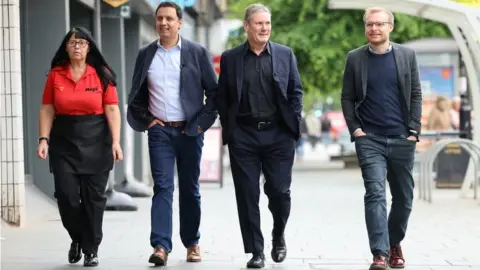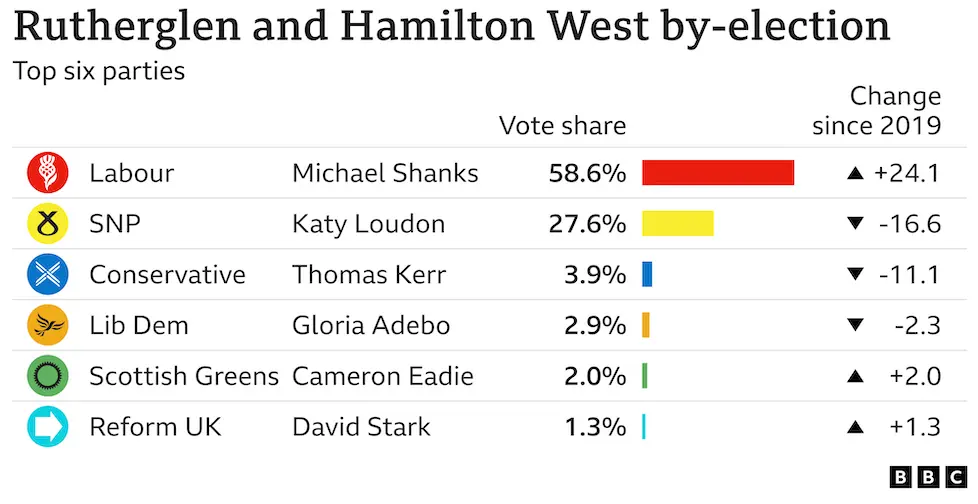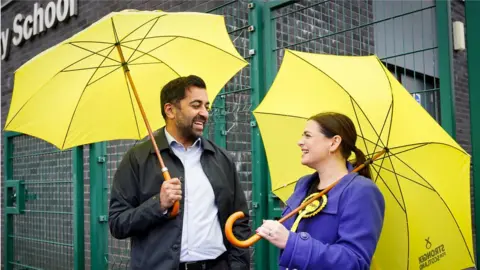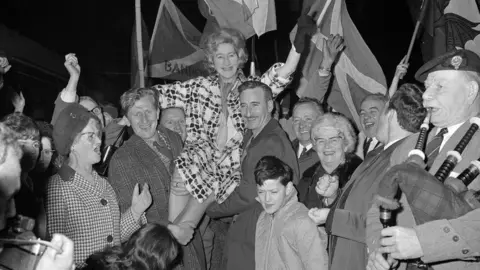Rutherglen and Hamilton West: What does by-election victory mean for Labour, the SNP and the general election?
 PA Media
PA MediaA decade ago, it was fashionable for opponents of the Conservatives to scoff that Scotland had more pandas than it had Tory MPs.
In recent years that taunt could have been directed at the Labour Party. Not any more.
With a resounding victory in Rutherglen and Hamilton West, Sir Keir Starmer has now met, though not yet exceeded, Scotland's political panda threshold.
There are two of the monochrome mammals in Edinburgh Zoo and, as soon as Michael Shanks and his Dr Martens boots can make their way to Westminster, there will be two Scottish Labour MPs in the UK parliament.
"Labour can kick the Tories out of Downing Street next year and deliver the change that people want and this country so badly needs," said Mr Shanks in his victory speech.
Edinburgh South's Ian Murray will presumably be delighted to have his company.
But panda parity is not the limit of Labour's ambition.
Sir Keir Starmer's eyes are fixed on the UK general election, likely to be held in either spring or autumn next year, when further gains in Scotland could ease his path to Downing Street.
This win, in which the party turned an SNP majority of 5,230 into a Labour lead of 9,446, with a swing between the two parties of 20.4%, is a huge boost.
Sir Keir will be doubly delighted to have seen the Conservatives collapse from 15% of the vote in 2019 to 3.9% in the by-election.
The Tory candidate Thomas Kerr said he had been "squeezed" by tactical voting, with voters keen to "send a message" to the SNP.
Either way, Labour are the undisputed champions.
 PA Media
PA MediaGenerations of Sir Keir's predecessors, from Harold Wilson to Gordon Brown, could rely on a big block of Scottish support in their attempts to form a government.
Labour sent 40 or more MPs from Scotland to Westminster in every general election from 1964 to 2010.
If the swing in Rutherglen and Hamilton West were replicated across the country, the party could soon be returning to those glory days.
Sir John Curtice, professor of politics at Strathclyde University, calculates that such a scenario could mean that "Labour would have 42 seats and the SNP would be back down to six seats" - although he warns that such speculation relies on a "very simple assumption".
In the closing stages of this campaign, the Labour leader described the South Lanarkshire seat as a "big prize", insisting that success here would be "a milestone" on his party's "hard road" back to power.
Maybe. But the road is long as well as hard.

The party has a vast amount of ground to make up in Scotland, where it placed fourth at the 2019 Westminster election with just one seat, behind the Liberal Democrats on four, the Conservatives on six, and the pro-independence Scottish National Party with a whopping 48.
Labour's troubles over the past decade or so were closely linked to its opposition to Scotland leaving the 316-year union with England, even though it campaigned successfully against the proposal alongside the Tories and Lib Dems in the 2014 referendum.
In Rutherglen and Hamilton West, the party dealt with the national question by ignoring it as much as possible, focusing instead on concerns about the SNP's stewardship of Scottish public services, and the Tories' handling of the economy.
Labour's winning campaign message can be summed up in three words: "Two failing governments."
Sir Keir and the party's Scottish leader, Anas Sarwar, were assisted by the resignation at the start of this year of that formidable campaigner, Nicola Sturgeon, as SNP leader and first minister.
 PA Media
PA MediaPolling suggests that her successor, Humza Yousaf, is less popular with voters, while the narrow nature of his victory in a bruising leadership contest exposed divisions within his party.
Labour was also helped by the headlines generated by a police investigation into the funding and finances of the SNP, including the arrests of Ms Sturgeon, her husband Peter Murrell, and the party's former treasurer Colin Beattie, as suspects for questioning. All three were later released without charge.
Labour was assisted too by the chain of events which led to the by-election.
In September 2020, at the height of the pandemic, the previous MP, Margaret Ferrier, took a train home from London after testing positive for Covid, a decision which led to her expulsion from the SNP and a criminal conviction for breaking lockdown law.
The affair so outraged locals that they turfed her out, in Scotland's first ever recall of a sitting MP.
Ferrier's behaviour was a hot topic on the doorsteps during the campaign but activists for both Labour and the SNP say the stand-out issues were the state of the NHS and the high cost of living.
Labour appears to have prospered from a deep sense of concern, even alarm, about both topics.

Still, Rutherglen and Hamilton West really was a must-win seat if Labour's revival is to have any credibility at all.
The party held it as recently as 2017 under Jeremy Corbyn and, when Ferrier won it back for the SNP at the 2019 general election, her margin of victory was decent but not huge.
Now Scottish Labour is back with a bang in a constituency which can claim to be the cradle of the movement.
The party's founder, Keir Hardie, first stood for election here in April 1888, less than 30 years after the construction of the old town hall, with its striking Scottish baronial-style clock tower, which still dominates Rutherglen's skyline.
These days it is a dormitory suburb of Glasgow and the air is clear but a century ago the town was ablaze with heavy industry.
In his 1922 book Rutherglen Lore, W Ross Shearer describes the intermingling of tenement dwellings and grimy factories, with "belching smoke" emanating from the furnaces day and night.
The collapse of coal, iron and steel manufacturing in the second half of the 20th Century took its toll, with pockets of deep deprivation remaining in and around the town.
 PA Media
PA MediaBut while Lanarkshire is steeped in Labour history, it is also sacred ground for nationalists.
The SNP's first ever Westminster victory came in Motherwell in 1945 and was followed by Winnie Ewing's landmark win in the Hamilton by-election of 1967.
Supporters of independence hailed that as a seminal moment, with Mrs Ewing herself declaring: "Stop the world, Scotland wants to get on."
This time, the SNP says anger about Ferrier, the party's status as an incumbent government and low turnout of 37.2% on a wet Thursday in October mean it would be a mistake to read too much into the result.
Labour are elated at the scale of this by-election victory, which exceeded their wildest expectations.
And yet, as a unionist party, one big niggle remains in the cold light of day.
While the SNP has slumped in the polls, support for independence has barely moved, hovering at around 47-48%.
 PA Media
PA MediaMr Sarwar says his strategy to deal with the national question is to govern well. Voters, he argues, will begin to cool on independence when they see a Labour government performing well for them at Westminster and, he hopes eventually, in the Scottish parliament.
"If… we can demonstrate competence, demonstrate that change is possible, then I think you'll get people to move on that," he told me on the eve of polling.
Is that realistic? The by-election has highlighted divides within Labour, and particularly between the Scottish and London parties.
In modern studies teacher Michael Shanks, Labour now has an MP who has openly contradicted the UK party's official positions on welfare benefits and gender.
Along with other Scottish Labour parliamentarians, Mr Shanks has criticised the two-child benefit cap, which Sir Keir proposes to retain, and had appeared less cautious than the leader about the idea of making it easier to legally change sex on a birth certificate.
The new MP used also to talk about his hope of the UK re-joining the European Union. He even resigned from the party when it was led by Mr Corbyn, in part because of the issue.
Although he now stresses the need to "make Brexit better," it is a reminder that the UK's departure from the EU remains a tricky topic for Labour, not least because it was opposed by a big majority of voters in Scotland.
 PA Media
PA MediaSenior SNP sources argue that these issues and more will make governing hard if Labour wins the next general election, not to mention the perception of there being little money for any incoming government to spend to enact its agenda.
As a result, SNP strategists are now playing a long game which, they say privately, involves simply getting through the next year while trying to build support for independence in time to focus on the next Holyrood elections in May 2026.
By then, one told me, the hope is that Scottish voters will have tried both flavours of the UK - Conservative and Labour - and will have concluded that they don't like either of them.
Whatever happens, one thing is clear. No longer will anyone in Scottish politics have to endure the ignominy of comparisons with a pair of pandas.
After 12 years on loan to Edinburgh Zoo, Tian Tian and Yang Guang are heading home to China this winter.
Someone will need to devise a new metric for political failure.
And when it comes to Rutherglen and Hamilton West, that metric will apply not to Labour but to the SNP.
